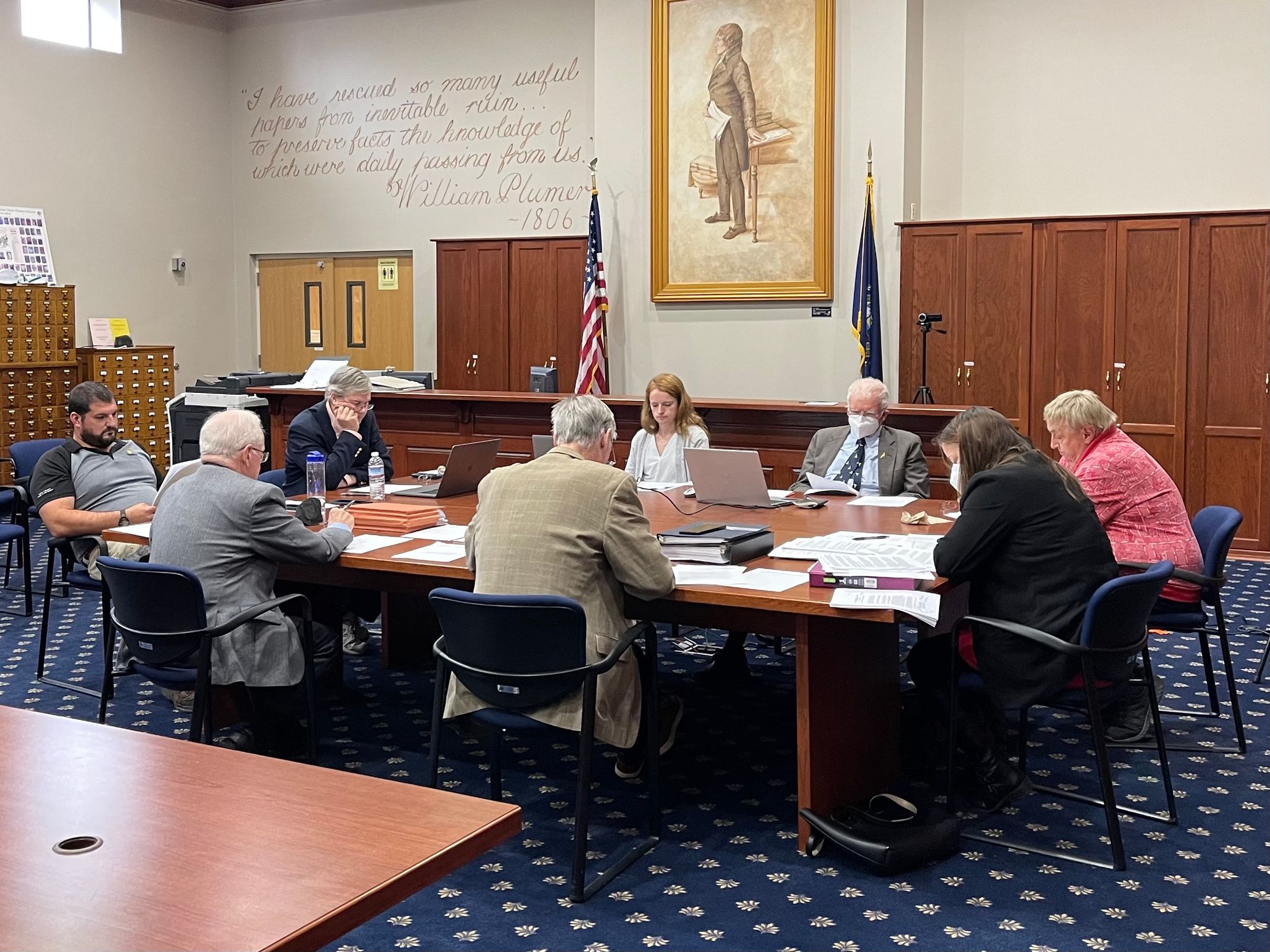Two ballot questions await NH voters on Election Day. Here's what they mean.

Voters will have a chance to answer two ballot questions during the midterm election on Nov. 8.
- The first asks whether the state should eliminate the register of probate position, a county-level elected office whose duties were mostly stripped in 2011.
- The second asks whether the state should hold a convention to alter its constitution.

Question 1: Should NH eliminate register of probate position?
The first question on the ballot asks voters if the state should eliminate a little-known position called the register of probate. It requires a two-thirds majority to pass.
Historically, the register of probate was an elected county official who would help people navigate probate court, which deals with things like estates, wills, adoption, and guardianship. After a court restructuring in 2011, these duties now fall to the court.
“Because the position is listed in the constitution with the elected officers, the title remained but no functions,” said Donna Sytek, a former Republican speaker of the House who served as register of probate for Rockingham County in 2016. “The register of probate doesn’t have an office, doesn’t have a phone. I always say it doesn’t even have a ballpoint pen.”
“I did nothing,” she said of her time serving in the role. She ran to make the case that the role should officially be done away with – but because it’s mentioned in the New Hampshire Constitution, that’s up to voters. Sytek said she didn’t accept the $100 yearly stipend that comes with the role but points out, with 10 counties, that’s $2,000 in needless state spending per biennium.

Sytek and others in favor of eliminating the role call the constitutional amendment a housekeeping measure. She believes court employees are better able to assist people struggling to navigate the court.
But Jane Bradstreet, who is running for register of probate in Merrimack County, argues there’s still a role for registers. Bradstreet has been serving as register of probate since 1999, with one two-year hiatus when she lost the 2018 election. After the 2011 court restructuring, registers of probate essentially lost what had been professional jobs that paid a salary. She was then tapped to develop the call center that took their place, and while the court has made strides on customer service, it’s far from perfect.
“There’s just about nobody there who can answer your question about probate court,” she said. “They have a kiosk in the lobby where you can do e-filing, but nobody comes out of the inner sanctum to help you.” That’s the gap that the register of probate used to fill.

People still call Bradstreet to ask for help. “I don’t have much power nowadays, but I still have influence and I know who to call,” she said.
Bradstreet encourages people to vote against eliminating the position.
Her opponent, Scott Maltzie, agrees. He chairs the Merrimack County GOP and is running for register of probate for Merrimack County, knowing the role could be eliminated. “That irony has not escaped me,” he said.
While Sytek ran for the position to campaign for its demise, Maltzie is running for its restoration. He wants to convince people that the position’s duties should be reinstated. Three Republican state senators also voted against the constitutional amendment when it was before the Legislature, where it secured enough votes to appear on the ballot.
“You have people that are grief stricken, perhaps dealing with one of the most difficult and challenging events of their lives, and they have to go into an electronic system that may be unfamiliar to them,” Maltzie said. “I think a lot of people in this position might be elderly, and maybe not as tech savvy as younger people are, and everybody’s busy. You know, you need some people in there that can help you navigate this.”

Sytek argues there’s no guarantee elected officials would be knowledgeable about probate court and court employees are better equipped to help.
The ballot question itself might seem confusing since it includes no mention of the register of probate. That’s because, by law, constitutional amendments are required to be printed on the ballot exactly as they will appear in the constitution if approved.
Here’s how the question is worded: “Are you in favor of amending articles 71 and 81 of the second part of the constitution to read as follows: [Art.] 71. [County Treasurers, County Attorneys, Sheriffs, and Registers of Deeds Elected.] The county treasurers, county attorneys, sheriffs and registers of deeds, shall be elected by the inhabitants of the several towns, in the several counties in the State, according to the method now practiced, and the laws of the state, provided nevertheless the legislature shall have authority to alter the manner of certifying the votes, and the mode of electing those officers; but not so as to deprive the people of the right they now have of electing them. [Art.] 81. [Judges Not to Act as Counsel.] No judge shall be of counsel, act as advocate, or receive any fees as advocate or counsel, in any probate business which is pending, or may be brought into any court of probate in the county of which he or she is judge.”
The only change this would make to the constitution is removing reference to the register of probate.
A yes vote is to eliminate the position and a no vote is to preserve it.
Question 2: Should NH have a constitutional convention?
At least every 10 years, voters get to decide whether the state should hold a constitutional convention to propose updating the state’s constitution. Ten years ago, they voted not to, by a margin of 64 percent to 36 percent, and so this year the question is being put to voters again. It would require a simple majority to pass.
It’s a chance for citizens to weigh in on one of the documents central to state government.
“This is the opportunity for the average voter, concerned citizens, the person in the county government, the person in local government to say, ‘I want my voice heard because I’ve got ideas about what we need to do,’” said Liz Tentarelli, the president of the New Hampshire League of Women Voters.
The last time the state held a constitutional convention was in 1984.
“It was like being a mini legislator for six weeks,” said Arnie Arnesen, who launched her political career by serving as her town’s delegate to the convention. She went on to serve as a Democratic state representative and was the first woman in New Hampshire to earn a major party’s nomination to run for governor. But when she first went to Concord, she didn’t have an agenda, she said, but curiosity. “You don’t run as a partisan,” she said, “you run as a citizen.”

Even though Arnesen recalls the convention fondly, she opposes having another one, pointing to toxicity in politics and misinformation. “This is the worst possible time to envision a constitutional convention because democracy is being threatened,” she said.
Maltzie, a Republican, agreed that now is not the time for a convention because of how polarized people are. “I think in the end we might end up with a much worse product,” he said.
If the measure is approved by voters, delegates would be elected in 2023 either at town meetings or by special election, according to Secretary of State Dave Scanlan. Each of the state’s 400 House districts would have the opportunity to elect a delegate to represent them at the convention.
That convention would be held at the State House and would require a three-fifths majority – or 60 percent of delegates – to vote in favor of an amendment in order for it to advance. In that case, the amendment would be put to voters during the 2024 election as a ballot question requiring a two-thirds majority to actually amend the constitution.
This story was produced by the editorially independent New Hampshire Bulletin is part of States Newsroom. Contact Editor Dana Wormald for questions: info@newhampshirebulletin.com.
